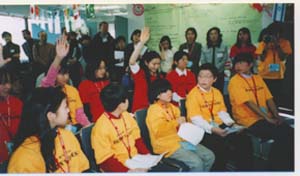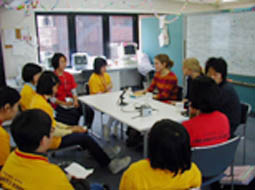|
 The first bureau in Asia of a worldwide, nonprofit media organization whose reporters and editors are school-age children opened in late January in Tokyo. The 34 correspondents at the Tokyo Bureau of Children's Express will report on important social issues, especially those affecting children and young adults.he first bureau in Asia of a worldwide, nonprofit media organization whose reporters and editors are school-age children opened in late January in Tokyo. The 34 correspondents at the Tokyo Bureau of Children's Express will report on important social issues, especially those affecting children and young adults. The first bureau in Asia of a worldwide, nonprofit media organization whose reporters and editors are school-age children opened in late January in Tokyo. The 34 correspondents at the Tokyo Bureau of Children's Express will report on important social issues, especially those affecting children and young adults.he first bureau in Asia of a worldwide, nonprofit media organization whose reporters and editors are school-age children opened in late January in Tokyo. The 34 correspondents at the Tokyo Bureau of Children's Express will report on important social issues, especially those affecting children and young adults.
Children's Express first began planning to set up a section in Tokyo in 1999. Training of the Tokyo correspondents began in summer 2000, and five of them have already gained firsthand journalistic experience through their coverage of the Republican Party convention in the United States.
On January 28 an event was held to commemorate the opening of the Tokyo Bureau. UNICEF goodwill ambassador and popular television personality Tetsuko Kuroyanagi was present for the ceremony, where CE reporters interviewed her about children in developing and war-torn countries who are suffering from malnutrition or have lost their parents.
Six CE journalists from the United States were also in Tokyo to hold the education issues that are of the most concern to them. They identified discussions with their Japanese counterparts. This will lead in summer 2001 to two days of public hearings and round tables led by CE journalists. They will present kids' voices and viewpoints on education to government officials and educators in Japan and the United States.
On the question of education reform, CE Tokyo reporter Ayumi Takano, 11, said, "I don't think things should be decided just by teachers and adults. They should ask children's opinions, too. The people that will be affected by the new system are children after all."
Children's Express was established in 1975. Besides Tokyo, it has bureaus in the the United States and the United Kingdom. Stories produced by approximately 700 CE reporters (ages 8 to 13) and editors (ages 14 to 18) are distributed to adult print, broadcast, and interactive media, including the Asahi Shimbun--Japan's second largest newspaper--and the New York Times News Service.
 The young reporters head for their bureaus after school. They go out to interview people and gather information. When they aren't out in the field, they prepare news materials in the office. The young reporters head for their bureaus after school. They go out to interview people and gather information. When they aren't out in the field, they prepare news materials in the office.
Children's Express has won prominent awards for outstanding journalism and was nominated for the Pulitzer Prize. It has been giving children a significant voice in the world by bringing the insights that only they can provide to education policy makers, opinion leaders, and other adults.
Photos: (top) Children's Express journalists ask questions at the opening ceremony; (above) Children's Express journalists interview visiting German students on the topic of education. (Tokyo Bureau of Children's Express)
|

 The first bureau in Asia of a worldwide, nonprofit media organization whose reporters and editors are school-age children opened in late January in Tokyo. The 34 correspondents at the Tokyo Bureau of Children's Express will report on important social issues, especially those affecting children and young adults.he first bureau in Asia of a worldwide, nonprofit media organization whose reporters and editors are school-age children opened in late January in Tokyo. The 34 correspondents at the Tokyo Bureau of Children's Express will report on important social issues, especially those affecting children and young adults.
The first bureau in Asia of a worldwide, nonprofit media organization whose reporters and editors are school-age children opened in late January in Tokyo. The 34 correspondents at the Tokyo Bureau of Children's Express will report on important social issues, especially those affecting children and young adults.he first bureau in Asia of a worldwide, nonprofit media organization whose reporters and editors are school-age children opened in late January in Tokyo. The 34 correspondents at the Tokyo Bureau of Children's Express will report on important social issues, especially those affecting children and young adults.
 The young reporters head for their bureaus after school. They go out to interview people and gather information. When they aren't out in the field, they prepare news materials in the office.
The young reporters head for their bureaus after school. They go out to interview people and gather information. When they aren't out in the field, they prepare news materials in the office.